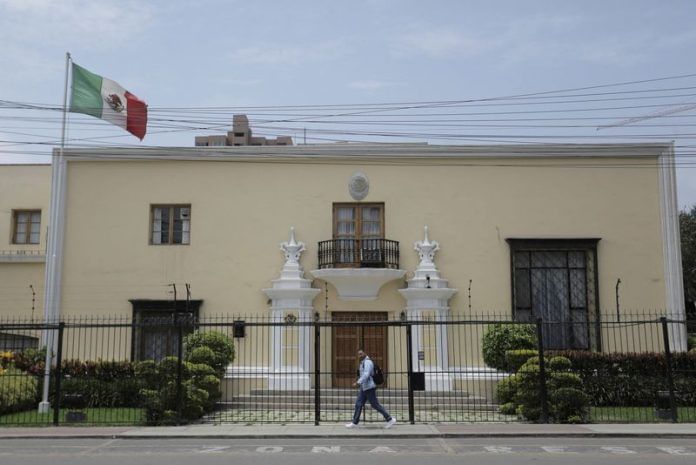By Marco Aquino
LIMA (Reuters) -Peru’s government will decide this week whether it should grant safe passage to Mexico to an opposition politician holed up at the Mexican embassy in Lima, the country’s foreign minister said, amid a tense standoff between the two countries.
Peru on Monday severed diplomatic ties with Mexico for granting asylum to Betssy Chavez, the last prime minister for Peru’s ousted and now jailed former President Pedro Castillo.
Peruvian Foreign Minister Hugo de Zela told Reuters that legal experts are urgently reviewing the “1954 Caracas Convention,” which Mexico invoked to justify the asylum.
“It’s an analysis we’ve asked to be done quickly, but with the necessary care to do it well,” said De Zela, who was tapped as foreign minister last month by Peru’s new President Jose Jeri after assuming office.
The conflict is the latest in a series of disputes between Mexico and Peru. Relations have been strained since Mexico granted asylum to Castillo’s wife and children following his arrest. Castillo is awaiting sentencing.
De Zela said a final decision on Chavez is expected by the end of the week. The foreign minister plans to travel on Saturday to Colombia to take part in a summit between CELAC (the Community of Latin American and Caribbean States) and the European Union.
Chavez is facing charges of conspiracy for her alleged role in Castillo’s 2022 attempt to dissolve Congress. Prosecutors are seeking a 25-year prison sentence for her.
TROUBLED RELATIONS
Peru said it broke relations with Mexico due to the “unfriendly act” of the northern country granting asylum to Chavez.
“We are interested in having good relations with all countries in the region… provided it is clearly understood that there cannot be interference in internal affairs,” De Zela said.
Chavez, who has denied the charges against her, had been imprisoned since June 2023 and was released by a judge in September of this year to prepare her defense while at liberty.
“Mexico has constructed a kind of parallel reality where there is a political persecution that does not exist,” De Zela said.
Despite the break in formal relations, officials are working to minimize the impact on their economic partnership, the foreign minister added.
As members of the Pacific Alliance trade bloc, the countries share significant commercial and tourism ties, with bilateral trade totaling over $2.5 billion last year.
(Reporting by Marco Aquino; Editing by Aida Pelaez-Fernandez, Alexandra Hudson)
Disclaimer: This report is auto generated from the Reuters news service. ThePrint holds no responsibility for its content.






